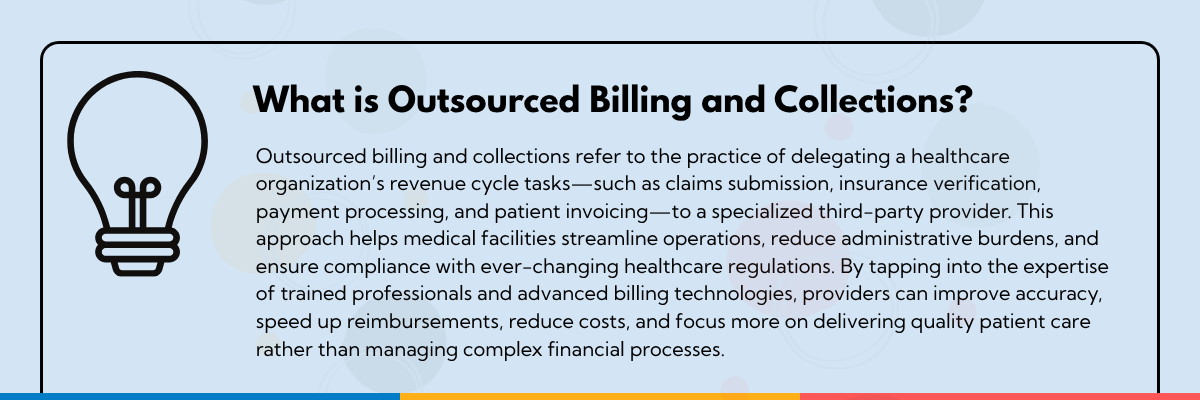IN THIS ARTICLE
Table of Contents
The healthcare industry is becoming more complex than ever, fueled by evolving regulations, rapid technological advancements, and increasing patient expectations. Managing complicated insurance requirements, frequent coding updates, and stringent compliance mandates requires significant resources and specialized expertise.
This can overwhelm medical organizations, leading to inefficiencies and lost revenue. To stay focused on delivering quality patient care while maintaining financial stability, many turn to outsourced billing and collections.
Medical billing outsourcing allows providers to streamline operations, improve accuracy, and ensure timely reimbursements. In this article, you will learn how outsourced medical billing and collections work, their benefits, and how to select an outsourcing partner. Continue reading!
Benefits of outsourced billing and collections

In today’s dynamic healthcare industry, outsourcing billing and collections has become a viable solution for organizations seeking to optimize their operations. Partnering with a business process outsourcing (BPO) provider enables healthcare facilities to address revenue cycle management challenges with professional expertise and advanced tools.
Healthcare BPO alleviates administrative burdens and helps organizations stay competitive in a rapidly evolving industry. Here are the advantages it brings:
Reduced operating costs
Outsourcing medical billing significantly reduces the overhead expenses of in-house revenue cycle management. Healthcare BPO eliminates the need to hire, train, and maintain specialized billing staff.
Additionally, it minimizes the costs of purchasing and updating billing software and managing compliance requirements. This cost-effective approach allows practices to allocate resources toward patient care and strategic initiatives.
Access to specialized expertise
Healthcare organizations gain access to industry-trained professionals who specialize in revenue cycle management. These experts stay updated on the latest coding standards, insurance regulations, and compliance requirements for accurate and timely claims processing.
By leveraging this specialized knowledge, practices can reduce errors and maximize reimbursements. A healthcare BPO firm can handle billing and collections precisely, freeing internal teams to focus on patient care.
Improved cash flow and fewer errors
Outsourced billing and collections streamline the claims process, resulting in faster payments and a more consistent cash flow for healthcare providers. Professional billing teams use advanced systems and specialized expertise to minimize errors in coding, claims submission, and follow-ups, reducing the risk of denials.
This efficiency ensures that reimbursements are received promptly, maintaining financial stability for medical practices. With providers, healthcare organizations avoid delays caused by inaccuracies and focus on delivering quality care.
How outsourced billing and collections work

Outsourcing your medical billing and collection processes involves partnering with a specialized BPO team that handles all aspects of the revenue cycle management. The provider takes over claims submission, payment follow-up, and insurance verification tasks, using their expertise for compliance and accuracy.
In 2023, approximately 92% of the U.S. population had health insurance coverage. Private insurance is also more prevalent than public options at 65.4% percent and 36.3%, respectively. This widespread coverage highlights the need for accurate billing and collection processes to maintain profitability among medical organizations.
With outsourced billing and collections, you can streamline operations, minimize errors, and enhance focus on patient care.
Explanation of the process from onboarding to invoicing
Outsourced billing and collections begin with thorough onboarding for a smooth transition and alignment with the practice’s needs. Once the setup is complete, the healthcare BPO team handles all aspects of billing and collections, following a structured workflow to maximize efficiency and accuracy.
Each step, from data entry to final invoicing, promotes timely reimbursements and minimizes errors.
1. Onboarding
The patient onboarding phase marks the beginning of the billing process and involves gathering essential information, such as patient demographics, insurance details, and medical codes specific to the provider’s practice. This initial stage is crucial for establishing a foundation for accurate billing and smooth claims processing.
The BPO team correctly captures and aligns all necessary data with the provider’s existing systems. They work closely with the healthcare provider to integrate this information seamlessly into the billing workflow.
2. Claims submission
After the onboarding, the BPO team submits claims to insurance companies using precise medical coding and accurate patient information. They ensure that claims meet all necessary regulations, reducing the risk of rejections or delays.
If issues arise during the submission process, the team works to resolve them quickly by contacting the insurer for clarification or corrections.
3. Payment processing
After processing the claims, the BPO team tracks payments to confirm the correct amounts are received. They follow up with insurance companies for delayed payments and prompt reimbursements. The team quickly addresses discrepancies or underpayments to maximize the practice’s revenue and reduce cash flow gaps.
4. Invoicing
In the final step, the BPO team generates clear, accurate invoices for patient balances, including details of services rendered and payment history. They send invoices to patients with transparent breakdowns and offer multiple payment methods. The process also includes follow-ups on overdue accounts to efficiently collect balances.
Key players involved
Outsourced billing and collections involve several key players who contribute to the process’s efficiency and accuracy. Their roles ensure that claims are processed, payments are collected, and financial operations run smoothly.
- Healthcare BPO provider. The third-party organization manages the complete revenue cycle, including accurate coding, claims submission, payment follow-ups, and compliance with healthcare regulations. They handle most administrative tasks, allowing healthcare providers to focus on patient care.
- Healthcare organization. The medical practice or facility that provides patient care supplies the necessary patient information, including medical records, treatment codes, and insurance details. They maintain data integrity and oversee billing processes to comply with healthcare standards and internal policies.
- Insurance company. The organization reviews and processes claims submitted by the healthcare organization to determine reimbursement eligibility. It is responsible for evaluating the claims based on policy coverage and getting appropriate payments for the practice, following the terms of the patient’s insurance plan.
- Patient. After insurance reimbursement, the patient is responsible for paying any remaining balance. Copays, deductibles, and coinsurance are often paid through various methods.
Industries that utilize outsourced billing and collections

Various industries that require specialized financial management and streamlined administrative processes consider outsourced billing and collections. Outsourcing these functions allows organizations to focus on their core operations while ensuring timely payments and accurate financial tracking.
Healthcare and medical practices
Healthcare providers, including hospitals, clinics, and private practices, often turn to outsourced billing and collections to manage the complexities of medical revenue cycles. With ever-changing insurance regulations, coding standards, and patient billing requirements, outsourcing focuses on accuracy and compliance.
Legal and financial services
Legal and financial services firms rely on outsourced billing and collections to efficiently manage client invoicing and payment tracking. Accurate billing and timely collections are crucial for maintaining smooth operations and cash flow, given the complexity of their transactions, such as hourly rates, retainers, and various service fees.
Small- to medium-sized enterprises (SMEs)
Managing accounts receivable and invoicing can be challenging for small businesses, especially with limited resources. With outsourced billing and collections, SMEs can reduce overhead costs, improve cash flow management, and ensure timely payments without investing heavily in specialized staff or technology.
How to find the right BPO company for billing and collections
Outsourced billing and collections offer compelling benefits, but adopting the strategy is a significant business decision. Hence, you must carefully consider the pros and cons of medical billing and coding outsourcing.
Once you have decided that outsourcing is best for you, choosing a BPO company is your next big step. This is a critical decision that can affect your organization’s financial efficiency, and maintaining a good fit between your practice and the BPO provider is essential for long-term success and smooth operations.
Key criteria for evaluating BPO providers
Understanding how to research a medical billing outsourcing company is essential for evaluating its capabilities, reliability, and ability to integrate seamlessly with your existing processes. Here are the primary factors to assess:
- Industry experience. Look for a BPO firm with a proven track record in billing and collections within your specific industry.
- Technology and tools. Assess the provider’s use of advanced software and systems that can improve accuracy, efficiency, and compliance.
- Compliance and security. Verify that the BPO company adheres to all relevant regulatory standards and maintains strict data security protocols.
- Customer support and communication. Consider the quality of customer service and the provider’s ability to maintain clear and consistent communication.
- Cost-effectiveness. Evaluate pricing structures to ensure the BPO organization offers competitive rates without compromising quality or service.
Questions to ask during the evaluation
Asking the right questions can help clarify the BPO firm’s capabilities, processes, and alignment with your business needs. These questions should focus on understanding their expertise, approach to security, and handling of challenges.
Here are examples of questions you should ask:
- What experience do you have in handling billing and collections for businesses in our industry?
Understanding the provider’s industry experience ensures they are familiar with the unique billing and collections challenges you face. Industry-specific knowledge can help avoid potential issues related to compliance, coding, or specialized payment processes.
- How do you comply with healthcare regulations (or relevant industry standards) and protect patient/customer data?
This highlights the provider’s dedication to regulatory compliance, including safeguarding sensitive information, which is essential in industries such as healthcare and finance.
Given the high costs of non-compliance with regulations such as the Health Insurance Portability and Accountability Act of 1996 (HIPAA), confirming that the provider has strong policies is crucial. Meeting standards demonstrates their ability to protect patient data and effectively uphold industry requirements.
- What technology do you use for billing and collections, and how do you integrate it with our existing systems?
The provider’s technology stack can significantly affect the efficiency and accuracy of billing and collections. This question helps determine whether their tools are up-to-date, secure, and compatible with your existing systems for smooth integration and minimal disruption to your processes.
- Can you provide case studies or references from similar organizations you have worked with?
Requesting references or case studies from similar businesses allows you to gauge the provider’s track record and success in your industry. Positive testimonials from similar organizations can provide confidence in their ability to handle your specific needs effectively.
- How do you handle denied claims or payment discrepancies, and what is your approach to follow-up?
A provider’s approach to handling denied claims and payment issues is crucial to minimizing revenue loss. This question assesses their ability to quickly address and resolve problems, process payments efficiently, and promptly resolve discrepancies.
- What is your pricing structure, and how do you promote cost efficiency without compromising quality?
Understanding the pricing structure is essential to run the service within your budget. This question helps clarify whether the provider offers competitive pricing while maintaining high-quality service, enabling you to assess the long-term value of the partnership.
The bottom line
Outsourced billing and collections can significantly improve operational efficiency, reduce costs, and enhance cash flow for your organization. By selecting the right BPO provider, you can streamline your financial processes, guarantee compliance, and focus on your core business activities.
To get started, evaluate potential providers based on key criteria, ask the right questions, and choose a partner that aligns with your needs. Learn how we can help you optimize your billing and collections today. Let’s connect!





